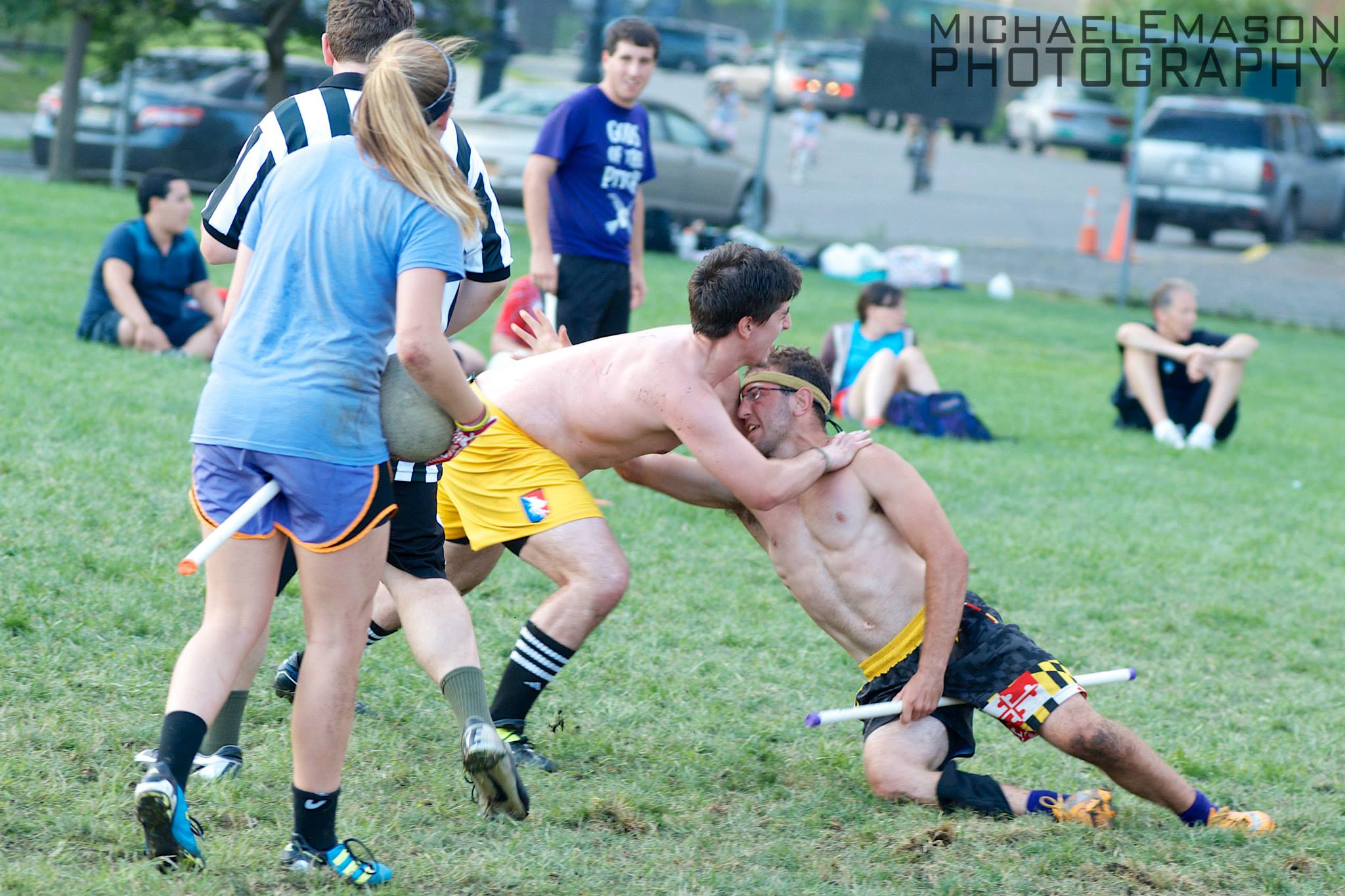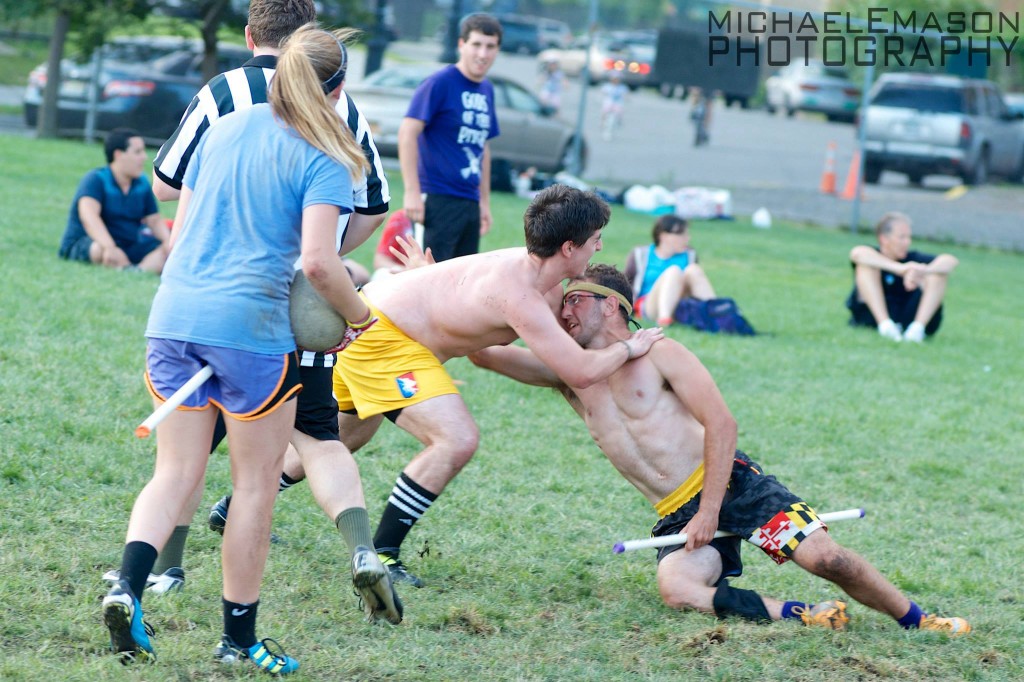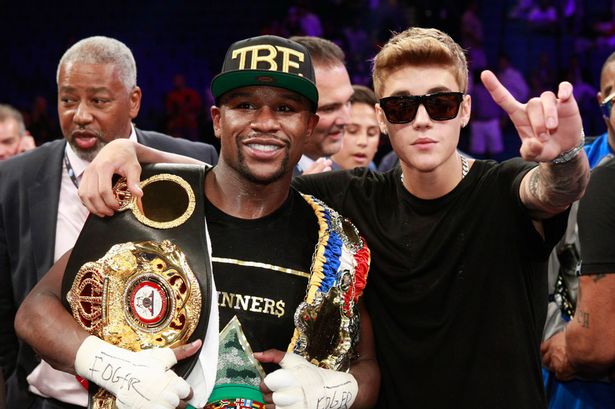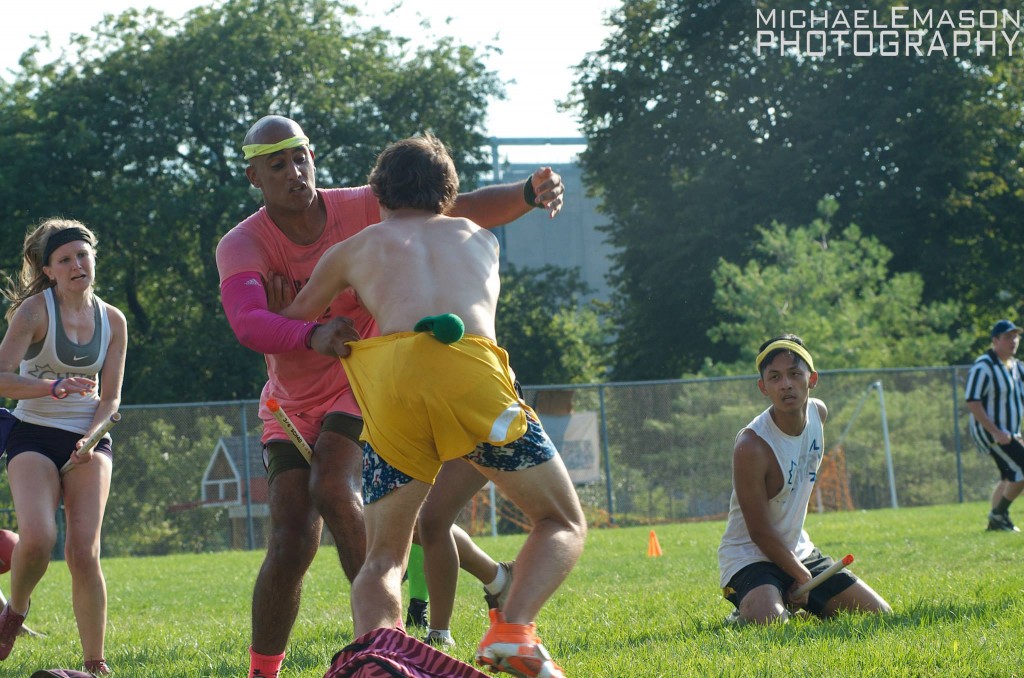- Rule, Britannia, no more?
- Unpopular Opinions: US Quadball Cup 2023
- Proven Contenders: University of Virginia
- Proven Contenders: Rutgers University
- Proven Contenders: University of Michigan
- Proven Contenders: Creighton University
- Different Perspectives: A Look Inside USA Ultimate
- Antwerp QC, Much of Belgian Core, Leaves Competitive Quidditch
Northeast Fantasy, Floyd Mayweather, and the State of Officiating
- Updated: September 19, 2013


Harry Greenhouse’s three snitch pulls in the Northeast Fantasy final, all of which were called no good, brought to the spotlight the continuing controversial nature of our sport. Credit: Michael E. Mason/IQA Staff
Today, we’re here to talk about refereeing in quidditch. But to truly understand my concerns for the future of our sport’s officiating, I need you to indulge me in a quick off-topic story that shows what can happen when sports officiating goes wrong.
On Saturday night, the boxing world saw its biggest fight in months, as Floyd Mayweather continued his incredible career with a dominant victory over Canelo Alvarez. Though there was no knockout, the result was never in doubt, as Alvarez managed to put together victories in at most one or two of the 12 rounds. ESPN and Yahoo scored the fight 120-108, while the AP had it 119-109.
The result was never in doubt, that is, until it suddenly was. Boxing is scored by three judges, who make a qualitative analysis. C.J. Ross, one of the three judges, saw the bout as a dead draw, 114-114. Had one of the other two judges been just as incompetent, and ruled that Alvarez won more rounds, Mayweather could have seen his victory swept right out from under him.
C.J. Ross is considered a highly esteemed judge, and yet was just as poor a year ago when she took away a well-deserved victory from Manny Pacquiao, giving it instead to Timothy Bradley, a result that sent the boxing fandom into a rage.
While Ross is at fault to a degree for her judgement, the sport itself is at fault for creating a system of officiating that leaves too much up to the judge’s interpretation. Officials are capable of working within the guidelines that are set, but when they are given freedom to interpret, they will take it.

On the other hand, if another judge had been as incompetent, we would have seen less of the Biebs. Credit: Reuters
Which brings us back to quidditch. WCVI was seen as the coming out party of the great renaissance of quidditch refereeing. The Referee Development Team had taken great strides towards the standardization of referees, and head referees in particular were more confident and decisive than ever before. The elimination rounds, especially the semifinals and finals, ran very smoothly, and the referees stayed out of the headlines, right where they want to be.
But the results of the late rounds of the tournament covered up the underlying problems still facing officiating. Of the seven matches that composed the quarterfinals, semifinals and finals, only one was within snitch range. The controversy was low because the games weren’t competitive. To truly test the current state of officiating, we needed high leverage games that were hotly contested.
Which brings us to Northeast Fantasy. Of course a fantasy tournament isn’t going to be the height of competition, but consider that Northeast was the biggest tournament of the past four months, and featured a refereeing crew in the knockout rounds that included two members of the RDT, four referees that had worked the semifinals and finals of WCVI, a full eight certified referees of the 2012-2013 working the finals along with the most respected scorekeeper in the game. If there was a better chance to audit the current state of officiating, I’d be surprised.
What played out on the fields just across an island from the refereeing travesties of WCV was good and bad. The referees showed the same traits that helped them impress in Kissimmee, putting in strong and impressive shifts. But despite this, the games were close and the controversies came hard and fast.
Below, I’m going to discuss three of the most glaring situations I saw in the final rounds of the tournament. I want to first make clear that my goal here is not to undermine the referees involved. The problems I will discuss are systematic, not a reflection of the specific referee who made or didn’t make a call. I was even an assistant referee for two of the games I will discuss, and was just as responsible as anyone else.
Quarterfinals: When the Score isn’t the Score
In the first round of elimination play, Benny Nadeau and his harem were paired up with Samy Mousa’s side from what most considered the tournament’s weakest pool. It came as little surprises too many as Nadeau’s showy side jumped out to near-decisive 30 point lead. As the snitch returned to the pitch, a controversial goal was ruled good for Mousa’s team, reducing the lead to 20 points. But the scoreboard remained 70-40 in favor of Nadeau. Nadeau’s team assumed the scoreboard was accurate, and played conservatively with their 30 point lead, right up until the point where the snitch was caught and they had suddenly outright lost.

An innocuous game-tying snitch grab for Samy Mousa’s team turned controversial when Benny Nadeau’s teams was suddenly told they had actually lost. Credit: Michael E. Mason/IQA Staff
The fixed here are by far the simplest of the three. Communication between a head referee and the supporting scoring staff has to be very clear, and if possible a head referee needs to check and double check a scoreboard. But a head referee has enough on their plate to begin with, and even in situations like the World Cup where five scoreboards surrounded the finals field, scores were still being messed up here and there.
What should be done, instead, is the standardization of scorekeeping within the sport. We could not hold the scorekeeper at fault for their error in the Northeast fantasy game, because there are no rules that a person has to keep score on a board or even that the score needs to be tracked publicly at all. This needs to change. The community has to push for the next rulebook to define a scorekeeping position, and perhaps eventually turn scorekeeper into an officiating position. The more scorekeepers we can develop like Martin Pyne, the less teams will get screwed over by innocent but costly clerical errors.
Semifinals: Standards of Behavior
After Mousa’s 10-point win, his team found themselves up against the tournament’s most dangerous team and the eventual winners, led by Michael Parada, a short time later. The game got off to an inauspicious, with Parada’s team becoming frustrated by some questionable goal judging that may have cost them some early points. I’m not here to discuss goal judging in our sport – I don’t think there is an easy fix for what I feel is the most difficult part of officiating quiddtich – but rather the reactions of a specific member of Parada’s team to it.
At first, a few members of Parada’s team complained in a respectful and acceptable way to the head referee about the calls. But people began to get worked up, culminating in one of Parada’s key players throwing his broom as hard as he could into the ground after not getting a call to go his way.
Here, unfortunately, the rulebook affords the head referee too much leeway. Personally, I would have my red card out immediately for “egregious conduct” as specified in 7.2.10 of the rulebook. I wouldn’t even think twice because not only did he act out in a potentially dangerous manner, but the anger was directed directly at an official, even if the throw itself wasn’t. However, you could just as easily yellow card for “shows disrespect to an official” as in 8.1.3, or a referee could judge that the player was taking his anger out in a healthy way and show no card.
In this case, the referee decided to keep the cards in his pocket. Now let’s consider just how much this game hinged on one split second judgment that a referee is rarely faced with. If I had been head refereeing, Parada would have lost a key cog in the opening minutes of the game and given Mousa a two minute man advantage in the process. The game ended only 100*-30, so things could have easily swung. Even the yellow card might have been enough for a 20-point swing that would have kept things in snitch range. But the no card allowed Parada to continue easily enough on their way to the title.
There are two things that I think can be done here. First, better standards for egregious play should be added to the rules. Referees need to know exactly when they need to reach for the dreaded red card, in order to make share all players are getting a fair shake. At the same time, training of referees can focus more on the situations less seen. The average field test will have very standard game situations, and unless a referee has a background in other sports, seeing their first egregious action from a player could catch them off-guard. But with better preparation, our player’s behavior can be better analyzed and their punishments better standardized.
Finals: A Snitch Grab, By Any Other Name…
Which brings us to perhaps the most glaring issue facing officiating in our sport today. The finals of Northeast fantasy was right up there with Firemercs as the most exciting matches of the summer. Parada and Nelson’s teams traded blows like prize fighters, with Nelson briefly pulling ahead only for Parada to close in yet again. The results were left to the seekers, where Harry Greenhouse faced off with Andrew Zagelbaum and Parada himself.
The situation that followed was nothing short of disappointing. In total, Greenhouse made three controversial snitch grabs. Depending on who you ask, you could get opinions ranging from them all being good to them all being bad. And that’s just amongst the referees of the game themselves. One was called off for a beat, another for the snitch being down, another for illegal physical contact. Somewhere along the line, Greenhouse was also allowed to play for an extended period of time without a shirt until, suddenly, he wasn’t anymore.
Each of these three calls was a judgment call, and a close one at that. To make things even more difficult, the head referee is hearing both sides of the story, was not watching the play because his attention must be focused on quaffle play, and yet still has to rule on the catch. I’d honestly be surprised if each of these decisions was anything more than a coin flip, and while a fantasy tournament is one thing, we don’t want the finals of the World Cup hanging on a series of coin flips.
So what can we do to fix this? Well, as much as people love toting instant replay as an option, we simply aren’t there yet as a sport. To include that in the rules requires the ability to have standardized replay setups for any official match. We still haven’t gotten a smooth live stream of a World Cup working yet! Not to mention that it would require replay personnel, when we are still working on solidifying more vital positions for games.
No, the best fix currently would be a change in the snitch rules to take out some of the toughest judgments, starting with the contact rules. Right now, you could argue that almost every grab that isn’t a sneak-up-and-pull in some way at some point broke the contact rules. But because limited contact is allowed, sometimes seekers are called on it, and sometimes they aren’t, with the difference between the two situations almost non-existent. By either toughening or loosening the rules, there would be less minute judgement.
The next thing that might be worthwhile is, when the staff can, pulling one bludger referee onto the snitch as well as the snitch referee to monitor bludger play. The snitch referee is too focused on the physical interplay between snitch and seeker to be able to make the judgment of whether or not a seeker was beat in time. Not to mention seeing if the ball made contact at all. Get more eyes on the scene, and a quidditch games most important play will be ruled justly.
The Northeast Fantasy finals left a bad taste in many people’s mouths. But with a referee team as strong as that match had, we can’t expect for much better as the season begins. All we can hope for is that the adjustments are made to avoid something similar happening in a match of true importance.

4 Comments